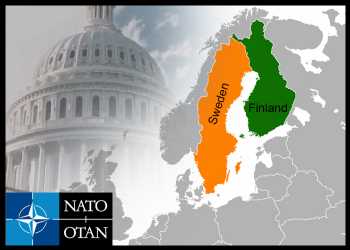The Senate has overwhelmingly endorsed the NATO Accession Protocols for Sweden and Finland.
The upper chamber of the U.S. Congress voted 95 to 1 in favor of the accession protocols on Wednesday.
This marks the United States’ first step in giving its approval to Finland and Sweden’s NATO membership bid.
The North Atlantic Council’s approval of the applications for NATO membership requires ratification by the parliaments of all the countries of the 30-member bloc.
With President Joe Biden signing the accession protocols, the United States will become the 23rd NATO member to ratify the two countries’ membership bid.
Biden thanked the members of the Senate – especially Majority Leader Chuck Schumer, Minority Leader Mitch McConnell, Senators Bob Menendez and James Risch — for their leadership and for quickly advancing the ratification process, the fastest Senate process for a NATO protocol since 1981.
“This historic vote sends an important signal of the sustained, bipartisan U.S. commitment to NATO, and to ensuring our Alliance is prepared to meet the challenges of today and tomorrow,” Biden said in a statement.
Finland and Sweden joining the alliance will further strengthen NATO’s collective security and deepen the transatlantic partnership, according to him.
Biden had told Finland’s President Sauli Niinistö and Swedish Prime Minister Magdalena Andersson when he hosted them at the White House in May that the United States remains committed to the security of Sweden and Finland.
NATO leaders made a historic decision to invite Finland and Sweden to become members of the alliance at their summit in Madrid in June.
The protocols were signed on behalf of the United States and other parties to the North Atlantic Treaty on July 5 in Brussels.
Article 10 of the North Atlantic Treaty, which outlines NATO’s Open Door policy, is part of the doctrinal foundation of the Alliance.
The defense alliance currently has 30 members. A potential expansion of the defense bloc with the addition of these two countries is seen as a big political challenge by Russian President Vladimir Putin as his war to conquer Ukraine grinds ahead.
Source: Read Full Article
